- Home
- Chuck Wendig
The Raptor & the Wren Page 8
The Raptor & the Wren Read online
Page 8
“Cutting right to the chase,” she says. “I admire that.”
“I’m nearby,” he says.
Wait, what? Her heartbeat spikes as adrenaline and cortisol throttle her with separate hands. She’s fighting just how badly she wants to take flight straight into Louis’s big cannon-sized arms. It makes her feel small and stupid and yet, the heart wants what the heart wants, and right now her heart wants to kung-fu kick its way out of her breastbone and leap toward him.
“How are you nearby? Are you stalking me, weirdo?”
“No—I just—I know where you live? Remember? I thought we could catch up at that same diner we met last time, the one where you met Samantha.”
“That’s in Florida.”
He hesitates. “Yeah, I know. Aren’t you . . . Oh.”
“I’m not there, Louis. I’m sorry. I’m in Pennsylvania.”
“Oh. Hell. I just figured—”
“With me, never figure anything. Always assume you’re wrong about whatever it is you think when it regards my narrow ass.”
He laughs, even though she means it as genuinely serious advice. “I can be up there in a couple days.”
“You on the road again?”
“I am, but this is on vacation.”
“Samantha with you?” Samantha, who you will strangle and drown in, oh, about five months? “I don’t know if I want to—”
“No. She’s not here. It’s not that kind of vacation. I needed time off. I need to see you. It’s . . . it’s about her.”
“What does that mean?”
“I need to show you something.”
She presses the phone to her chest and cranes her head back. She whispers a scream to the roof of the car. Then, back into the phone: “Fine. Be up here in a couple days. I’m dealing with stuff up here, so—”
“From your mother’s estate?”
“Sure.” We can go with that.
“I can help.”
“You can’t help with this.” And she doesn’t want to drag him in, either. Though a venomous part of her bites back: You’re culpable, Louie, given that you were the one who dove into that river to save Wren and me. And then her middle tightens with sudden, renewed desire, and under her neck and at her wrists she feels blooms of heat. She wants him here. No—she wants him. Period. She wants him on top of her, around her, behind her, inside of her. “Just be here.”
She hangs up.
And screams in her car. Then laughs. Then cries. Then wonders just what the hell is happening, and what she thinks she’s doing.
EIGHTEEN
HEADLIGHTS IN THE DARK
Night and the lonely road.
She doesn’t find Wren because she has no way to find Wren. It was a delusion to think differently. Miriam feels wired and tired in equal measure. Feels like a body without its skin—raw, cold, bleeding. Every thud of her heart felt keenly across every inch of her. She starts to think, Just let it all go. You don’t owe anybody any part of this. But she does. She’s responsible. Is this what being an adult feels like? It’s gross. She wants to drink and smoke and fuck some rando and eat a whole bag of Skittles before hitchhiking on to the next place. That was her life once, and she hated it. But she misses it, too.
Because in its own way, it was easy.
But this? This isn’t easy.
Caring. Feeling obligated. Having a heart that isn’t a wicker basket full of dead birds. Ugh. So not worth it.
Darkness settles into the trees all around her. Oaks and pines. Thoughts of Louis stalk her like prey, and she has to keep ducking and running away from her own brain lest those thoughts catch her, pin her, consume her.
She pulls onto Dark Hollow Road—
And a car pulls in behind her.
Headlights like monster eyes. A new predator in pursuit. This one real.
It’s silly. It’s paranoid. Cars can drive on public roads. And Dark Hollow has other houses on it. The road doesn’t end in a wall—it goes on to other roads, as roads are wont to do. It’s only 9 PM. If it were 3 AM and some car were tailing her onto her road, she should be worried. This? Not so much.
And yet she’s worried.
It’s the coffee. And the lack of sleep. And Wren, and Louis and, and, and—she feels like she’s tiptoeing across a tightrope, and on one side is spiders and on the other side is sharks. And it’s windy. And the rope is on fire at both ends.
She pulls ahead to the house. Her mother’s house—a tall, dark sentinel standing vigil against the forest.
The car behind her slows.
It strikes her: I don’t have a weapon. She always has a weapon. A knife. A gun. A brick. Something. What does she have now? Miriam’s been so confuzzled over everything, she’s missing things. Bits are slipping through her fingers like earthworms struggling to escape a handful of dirt. She quick-searches around Grosky’s sedan but finds nothing—no gun under the seat, no knife in the cup-holder, no grenade belt in the glove compartment. Fucking Grosky.
The car drives up, and she thinks: Keep going, keep going, keep going.
The car turns into the driveway behind her.
Miriam kicks open the sedan door and launches herself out of it, striding toward the boxy-looking Buick pulling in behind her. Her eyes flit to the side of the driveway, where she spots a rock, palm-sized but jagged, like something one caveman could use to open the head of a second caveman. She lopes to the side, snatches it up, and marches toward her new enemy with grim purpose. She raises it high, ready to smash a windshield, ready to crush a skull—
Both doors to the Buick pop open. Shadows step out—because with the headlights staring her down, that’s all she can see. Dark shapes. Demons.
Then a voice comes out of the night. One she recognizes. One she hates that she recognizes.
“Hey, killer.”
Uncle.
Fucking.
Goddamn.
Lanky-strip-of-turd-jerky.
Jack.
NINETEEN
CRACKS IN THE GLASS
They sit in the living room. Her, Jack, and Jack’s lawyer.
Uncle Jack has tried to clean himself up a little for this meeting, it seems, which is a bit like a chimpanzee putting on a suit and pretending he’s not a chimpanzee. He’s stuffed his long length-of-rope body into an overstarched white button-down with tobacco spit stains on the collar and sleeve. The tie that hangs from his neck is an ugly maroon thing. A lumpy knot keeps the thing too short, and the accessory lies across his belly like the lazy, panting tongue of a Labrador with heat stroke.
It’s the lawyer she’s watching. Stumpy prick in a corduroy suit, his head so round he deserves to be in the Peanuts gang with Charlie Brown and Linus. He’s got a thin pencil sketch of a mustache and eyebrows that look so thick and so rough, you might want to use them to clean shit off your boot. Pale, too. The pale of a grub that has lived its entire life so far in the bark of a rotting tree.
“Young lady,” Jack says, all fakey-fakey proper-like. “As I said, this is my lawyer, Mr. Diamond—”
“Diamond,” Miriam repeats, failing to repress a snort-laugh. “Oh, damn. That’s rich. You guys are aware that irony is alive and well, right. I mean, this is textbook irony. You could teach it in English class.”
Jack looks confused. The lawyer adjusts his tie and tries to sit up straight. “I do not understand your point,” he says all too crisply, and Miriam imagines them as children standing on one another’s shoulders while stuffed in Daddy’s overcoat. This isn’t the kind of lawyer you find at an office. This is the kind of lawyer you find advertised on a bus. Or you find peeing in the parking lot of a local bar.
“I mean that the word diamond evokes something pristine, something clean and precious,” she says, sneering. “You, on the other hand, look like the opposite of that. You look like a goblin who just bathed in a toilet. You look less like a gem and more like a squirrel’s afterbirth. Hence: irony.”
The lawyer shrivels at that, but ignores it when he says, “My c
lient—”
“Jack is not a client. And you’re not a lawyer. This is a sham.”
“My client informs me you’re the executor of the Evelyn Black estate.”
“That is correct,” she saws, jaw tight. “Executor and executioner.”
“My client—”
“Uncle Dick-turd.”
“—Jackson Black feels that he is owed a portion of the estate, as Evelyn’s brother. And as her loyal and loving brother—”
“You mean as a sucking leech stuck to her side, milking her blood like the human parasite that he always was?”
“He feels that he is owed at least twenty-five percent of the estate—”
“I’d counter that he is owed twenty-five percent of my dick,” Miriam says.
“And failing that, he will gladly take possession of this house as recompense. Given the hostility here, we feel we have no recourse but to sue.”
Jack’s face fails to hide his delight at this. A greasy smirk on his face lifts and separates the hairs of his knotty, grotty goatee.
“What’s all this?” says Grosky coming up from behind.
“Grosky,” Miriam says. “This is my mother’s brother, my dear Uncle Jack. And this is the poop he pooped out this morning, a poop he has hired as his legal representation on this Earth, a ‘lawyer’ ”—here she does dramatic air quotes—“whose last name is, I kid you not, Diamond.”
“You need help down here?” the once-agent asks her.
“Aw, Grosky, that’s sweet you think I need help handling my business.”
He shrugs in response.
Jack leans in and says, “Well, young lady, did you find yourself a man? He’s a bit older than you, little out of shape, but it’s nice to see.”
She curls her lip, stands up with her chin out and her fists back. Miriam hisses: “Jack, Grosky could run a hundred laps around you before you manage to get your bony ass out of that chair. His asshole literally contains more brain cells than your actual brain.” Once again, she feels like she’s vibrating, like the mitochondria in all her cells are singing a single humming, thrumming hymn to her exasperation. In the noise of her mind, something else pings it—a sensation scratching at the top of her awareness.
“We will take you to court to resolve this—” the so-called lawyer starts to say, but she clacks her teeth at him and holds up a finger.
“Don’t interrupt me. Here’s how this is going to go. You’re going to sit there thinking you have some way to pry coins out of my mother’s dead hand, and I’m going to tell you a secret. Are you ready for my secret, Uncle Jack?”
“You’re a lezzie? Always kinda wondered—”
“I control birds with my mind.”
Pause for effect.
The reaction is predictable. Jack looks shocked. Diamond gives her a look like she’s cuckoo canary crazy. Then the both of them laugh, unsure if it’s a joke or some special brand of lunacy.
“Miss,” Diamond says, trying to compose himself. “This mockery of our request will not distract from—”
She silences him by holding up three fingers.
Then she takes one away: two fingers.
Her eyes look to the living room window—the one with the cracked glass where a small bird hit it. Then her eyes roll back in her head.
She finds what touched her mind out there in the black.
Two fingers become one, and then none.
Jack starts to say something—
The living room window shatters inward. Jack shrieks. Diamond cries out and hunkers down like he’s on a crashing airliner, head between his knees, hands over his head. Even Grosky startles.
Miriam doesn’t. Because she’s riding the owl when it hits the glass. Her mind is inside its mind. She is with it in the trees. She is with it as it takes flight. She wills it to find the glinting, flashing rectangle of light that is the glass window. The owl is a great horned owl, bigger than a red-tailed hawk, aggressive, angry, a female bigger than her male counterparts, and, to boot, a mighty hunter of the night who swoops on silent wing—
Now she’s inside. The bird wants to freak out, going through the glass like that, but she fills it with sinister calm and determined rage. Miriam splits her consciousness between herself and the bird (hey, I can do that?) as it lands atop the lawyer’s head, talons clawing their way across his slimy comb-over. Then it leaps to Jack, wings beating him about the head and neck, whumpf whumpf whumpf. He bats at it, but the owl doesn’t give a shit. The owl scrapes and scrabbles, fluttering her wings—
And then Miriam lets her go, sending her back out the open, broken window. She glides effortlessly away, making nary a sound.
The chaos in its wake is glorious. The lawyer paws at his head, his hands coming away red with blood. Jack’s still swatting at his own hair as if the owl remains upon him. And Grosky just stands there with eyes as big as his open mouth, staring out after the owl. Glass everywhere. Blood spattered.
She snaps her fingers. Diamond looks up, shell-shocked, blood streaking down his face in ruddy red rivulets.
“Get out,” she barks. “And you ever contact me again with any of this horseshit, I will have your eyes pecked out by hummingbirds.”
They hurry out of the house.
Her house.
Miriam feels like a god.
TWENTY
CHASING SHADOWS
The high doesn’t last. Sending Jack and his lawyer on their way fuels her only for so long, and then it’s time to settle into the realization that she doesn’t know what she’s doing or where to go next. Even finding Mary Stitch seemed easier, somehow—there she had leads. But finding Wren isn’t just a needle-in-a-haystack scenario: it’s trying to find a sewing needle in a pile of hypodermics. One will help her tie the thread. The rest will just stick her.
She spends two days barely sleeping. She and Grosky are on full alert, listening to local police scanners, and him getting tips from back in the Bureau. Into the second day, they send along a traffic cam photo from a stoplight about a quarter-mile from the bar where Donald “Tuggy Bear” Tuggins got chainsawed.
Grosky turns his laptop toward her.
Her guts go into her throat.
It’s like looking in a mirror. An alternate-reality mirror.
It’s her from five, ten years ago. Walking on the shoulder of the road as cars pass her by. Got that rangy, coyote walk that she used to have (maybe still has)—a young Miriam Black, stalking the highways, stealing from the dead. Even with the heavily pixelated image, she can see the same hungry glare. But this glare is not of a scavenger but of a hunter. This Miriam is already weaponized. This Miriam isn’t opportunistic. This version of her is already a killer—one who has preconfigured her grim purpose.
She holds her hand over her mouth. “That’s her.”
That’s me.
Grosky stares at her as she stares at the image. “She looks like you.”
“I know. She used to have red hair.” Now it’s all dyed black except for a few streaks of red. “The hell happened to her, Grosky?”
He looks to his laptop, starts summing up what he sees there. “Lauren Martin. Now age fifteen. Father on record hasn’t been a part of her life since she was born. Mother was a heroin addict, left her in an apartment. State eventually assumed custody, and the Caldecott School became her home at age ten.”
“Yeah, and Eleanor Caldecott, alongside her brood of murder-maggots, was using the school to weed out ‘bad girls’ like Annie Valentine and Wren, killing them before they could be inflicted upon the world.”
Eleanor Caldecott could see things too. The gift, she called it. It was her ability to see not how a person died but the consequences of how they lived. Annie Valentine was a girl who would leave a swath of human wreckage in her wake, and so through the Mockingbird, Eleanor had her killed—an agent of the goddess Atropos, snipping threads of fate so that destiny was changed, changing the future by murdering the present. Even now, Miriam tries to avoid the discomfort of thin
king herself somehow like the Caldecott witch. What Eleanor did was active. She hunted girls, “bad” girls, to kill them. Miriam is passive: she sees when someone is going to die, and then she tries to save them—and sometimes, sometimes that means killing a killer. She tells herself that what she does is purer somehow. Smaller. Cleaner.
Sometimes, though, she’s not so sure. Eleanor thought what she was doing was the right thing, too. Caldecott talked of cancer inside the body and how, to save the body, sometimes you had to remove an organ or cut off a limb. A grander, greater, colder view of the universe.
What is Wren’s view of the universe? She’s fifteen. How does she justify what she’s doing? What is her so-called gift?
Then, out of the dark, more words of Eleanor rise up.
Of Wren, Eleanor said to Miriam: You are a part of her life. You are just one more piece of her wreckage. Because of Lauren Martin, a piece of you will one day go missing.
Another proclamation. Ripples from a rock thrown in water.
Grosky keeps talking, shaking Miriam from her morose reverie. “Thing is, after you came through the place like a wrecking ball, the Caldecott School—and its three sister schools, Woodwine, Bell Athyn, Breckworth—all shut down.”
“You say that like it’s my fault.”
“It is. Strictly speaking.”
“Grosky, I saw a greenhouse full of jars. And in those jars were tongues. Tongues taken from girls that Eleanor Caldecott deemed too poisonous to live. Had to be fifty, sixty jars there. Tell me, the cops ever find that?”
“They did.”
“It ever hit the news?”
“Nope. The Caldecott family proper was wiped out, but they still had a legacy to protect, and family from overseas made sure that legacy was preserved. It’s why I’m writing this book. Because it’s frustrating. Power, money, legacy. All that protects the worst people.”
“So, fine, whatever, the Caldecott legacy is preserved even as the schools are shuttered. Where’d the girls go? The ones who went there.”
“The ones who could pay went on to other fancy schools.”

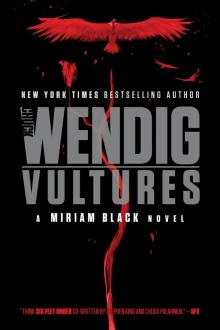 Vultures
Vultures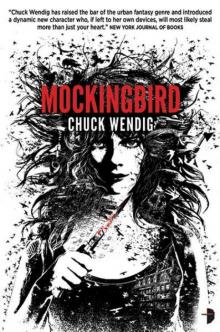 Mockingbird
Mockingbird Wanderers
Wanderers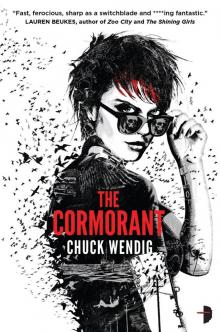 The Cormorant
The Cormorant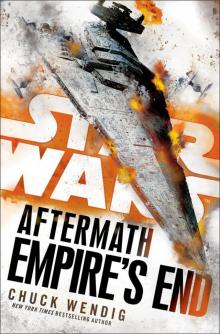 Empire's End: Aftermath (Star Wars)
Empire's End: Aftermath (Star Wars)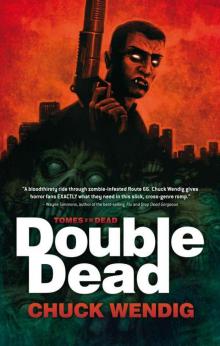 Double Dead
Double Dead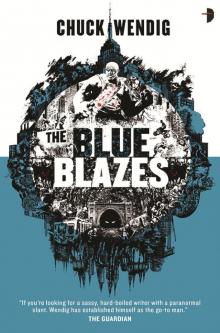 The Blue Blazes
The Blue Blazes 250 Things You Should Know About Writing
250 Things You Should Know About Writing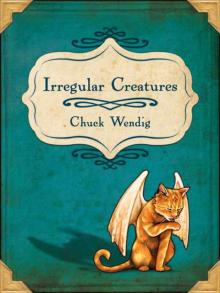 Irregular Creatures
Irregular Creatures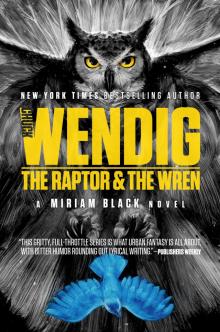 The Raptor & the Wren
The Raptor & the Wren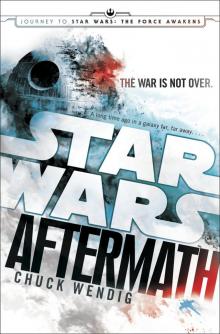 Aftermath: Star Wars
Aftermath: Star Wars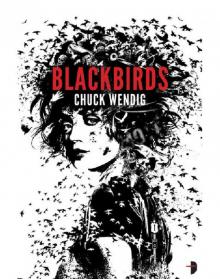 Blackbirds
Blackbirds The Hunt
The Hunt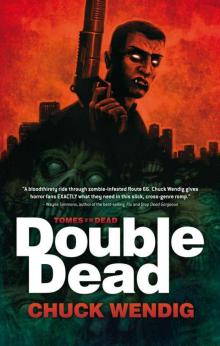 Tomes of the Dead (Book 1): Double Dead
Tomes of the Dead (Book 1): Double Dead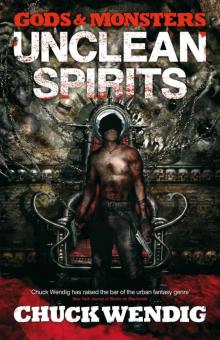 Gods and Monsters: Unclean Spirits
Gods and Monsters: Unclean Spirits The Harvest
The Harvest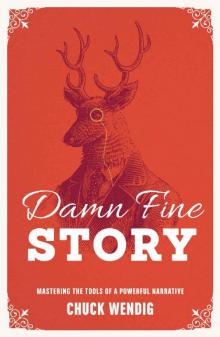 Damn Fine Story: Mastering the Tools of a Powerful Narrative
Damn Fine Story: Mastering the Tools of a Powerful Narrative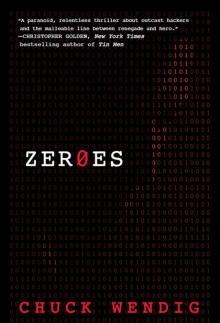 ZerOes
ZerOes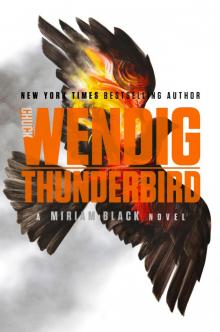 Thunderbird
Thunderbird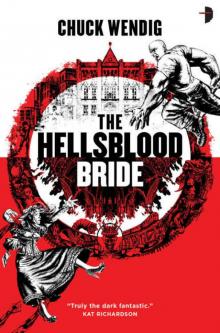 The Hellsblood Bride
The Hellsblood Bride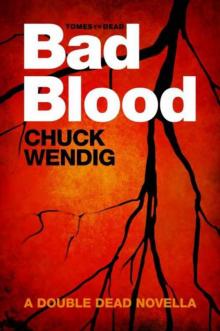 Double Dead: Bad Blood
Double Dead: Bad Blood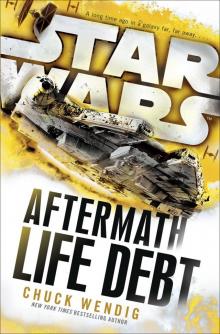 Life Debt
Life Debt